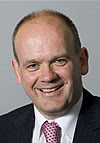
This morning we met to discuss the activities of the budget and performance committee in the coming year. In March we will be hearing from witnesses about the indistinct Olympic legacy - will East London benefit from new housing, a massive urban park and a glittering new economic settlement, or will we be saddled with a debt mountain and a collection of white elephants?
Subjects for consideration at later meetings were discussed but no final conclusion was reached. There was enthusiasm for digging into a number of matters:
Fare increases - would the rise in bus fares lead to a reduction in passenger numbers? If passengers were discouraged, how would they travel instead?
Policing - with the obvious shortcomings of using staff numbers as an indicator, how would we judge the performance of the Met in future?
Organising For Delivery - had the reduction in staff numbers at City Hall impaired the function of the core GLA?
Low income Londoners - how would services for the most needy be preserved in the newly cost conscious culture?
London Travelwatch - is London's transport watchdog providing value for money?
It is an interesting list, but very focused on the activities of the Mayor. Not unexpected, as the Assembly is responsible for scrutinising the executive arm, but our experience of Mayor led scrutiny during the 2000 - 2004 term was mixed. The 2004 - 2008 Assembly programme examined issues of wider interest to Londoners, and the Assembly was given greater credit for its effectiveness during that period.

5 comments:
Looks like it was a really well attended meeting?
B21, it's a picture of the chamber from my library of shots, not a live feed. Scroll down the stories and you will see it used elsewhere.
I notice that the huge redevelopment areas in north-west London are all getting separate "transport assessments" by boroughs, which are then rubber-stamped by TfL. However, ALL of the sites are still joined by old railway track beds (e.g. between the two Northern Line branches) and by hardly-used freight lines.
TfL is bust and therefore uninterested, and the LDA hasn't noticed.
Which part of the "Oversight of the Mayor" might query this subject please (do the AMs examine the "London Plan", for instance)?
Since well over £10-billion of private capital may be spent on these brown-field sites over the next twenty years (£5-billion at Brent Cross alone), it seems reasonable to ask if planning policies are really strategic enough.
There is potential for a second, off-road "DLR" in the outer London boroughs, that might, just might, be fundable, and possibly with an attractive benefit-cost ratio.
www.tiny.cc/NWLLRwiki
The idea that TfL should ever concern themselves with the views of the boroughs is, to put it mildly, novel.
The grandiose traffic schemes produced by this expensive and incompetent outfit are responsible for more traffic chaos than anything dreamed up by the boroughs.
Various bus companies fail to provide reliable/punctual services, and TfL do nothing about it. TfL has an absurd notion that a bus is on time if it is not more than 2 minutes early, or not more than 5 minutes late. As a public body they should try to look at it from the public perspective and not for the purpose of their (TfL's) Quality of Service Indicators (QSIs). QSIs are a deception perpetrated on the public and hide the reality.
The Assembly Members appear to be either unwilling to, or incapable of, exercising influence let alone control over the activities of TfL. Shame on them.
I can be as critical as anyone about TFL, but quite honestly, that range of lateness (and earlyness) isn't something that seems unreasonable to me.
It only needs a few unlucky traffic lights, and a bus can be five minutes late.
Having said that, I remember in the 1960s(!) that buses would soon be able to change traffic lights as they approached (or more likely, keep them on Green). What happened to that idea? Perhaps nowadays, car drivers would hack such a system with their own black boxes.
Post a Comment